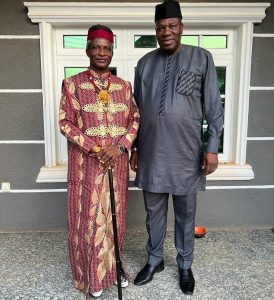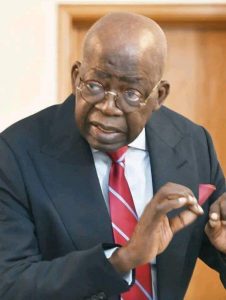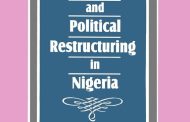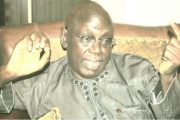The Idoma nation (this word again?) was expecting that one of President Tinubu’s ministers would come from that stock. That did not happen. For an ethnic minority which has, however, been historically dominant in terms of federal presence since the First Republic, this was an infuriating shocker. So much a shocker that the Benue Rebirth Movement (BRM) which now acts as the vanguard of Idoma nationalism took to the unusual strategy of addressing a news conference at which it alleged exclusion.

Amb Ella and the Och’Idoma
The BRM confounded pundits in taking to an unorthodox, activist tactic in a question of how a minority ethnic group could expand her political space in a mega nation. Some wondered why the approach was not that of a colourful courtesy call on the president at which a Senator George Akume would be conspicuously present and from which visit ‘good things’ will roll out?
Elements sympathetic to what is known as the ‘Idoma cause’ (the Idoma situation in Benue State as far as governorship is concerned is well understood at the most important centres of power across Nigeria) were also taken aback by the protocol arrangement at the BRM news conference. But BRM made its case although to the obvious anger of the Tinubu administration which obviously bided its time.
That seemed to have come when the administration had opportunity to confirm Permanent Secretary materials recently. Idoma alone got two. Although the process involved the potential Permanent Secretaries writing and passing examinations, two Permanent Secretaries from a small cultural group was also a message in appeasement in the context of the above. Whether it was Senator Akume’s handiwork or President Tinubu’s personal intervention, the message appears to have come through, given the number of open and small circle receptions and thanksgivings for the two Permanent Secretaries, particularly Ambassador Ella who is coming into technocracy from the diplomatic service.

Standing is Mr Omenka, the second of the Perm Sec from Idomaland
Although the BRM has not spoken yet on the Permanent Secretary gesture, it is interesting or symbolically significant that the Och’Idoma of Idoma has expressed gratitude to the president. It is possible that some elders and supporters of the Idoma cause have whispered the protocol subject matter to BRM just as it could also be that BRM is still studying the situation. That is if it is not that Intervention has missed such a statement which is very possible.
There is a sense in which history is repeating itself (although, in truth, history never repeats itself). In 1999 when the Obasanjo administration was to appoint ambassadors, all of them from Benue State – two career and one non- career – were Idoma. It is understood (but not confirmed) that Atiku Abubakar, the then Vice-President told his boss, then President Obasanjo that it is fairer for the Idoma to have all the three.
A special Adviser to then President Obasanjo suggested to Intervention that something was being worked upon in response to the situation in about five or so states in the country where certain cultural groups would find it impossible in terms of population to make the governorship. The plan was for the dominant ethnic group in all such states to make a choice between the governorship of the state and two ministerial slots at each election cycle. It was to be implemented by the president on seat. It is not clear whether this planned plan is another of the fatalities of the Obasanjo-Atiku combat. Nobody seems to have heard it again although the source of this story is still alive and very active in politics.

Sen George Akume
Without such an innovation, the Idoma, for example, are reaching a boiling point. But it is not everyone who shares their grief, citing eight years of Senator David Mark as more than enough for them. Others are still wondering why Mark did not seek to become the hero of the Fourth Republic by legislating the rotation of power principle at the state and local government levels. The problem is beyond Benue State as it is, in one way or the other, the problem also in Kogi, Kaduna, Katsina and Ogun, While some say Mark failed this test because he was not a traditional politician, given his military background, others argue it is because the Idoma never piled sufficient, irresistible pressure on Mark. It is something the Idoma should have led, given their dire situation in Benue State, said a keen observer with schooling roots in Otukpo.
The puzzle is how come the Idoma also cry: a minority ethnic group which had two ministers in the Northern regional government immediately after independence, service chiefs under Gowon, military governor under Murtala, minister and Chairman of Finance Committee in the Second Republic, half a dozen military governors almost throughout the IBB/Abacha era before the return of the David Mark consolidation of power at the National Assembly as well as a pillar of presidential power under Dr Goodluck Jonathan.

Great move, Mister president but Idomaland is an aggravated agro-industrial cum commercial desert oh!
Upon all these, not a single Federal Government industry exists anywhere in Idomaland. There is a spirited self-help approach to development among the new generation of politicians in terms of helping in job opportunities, one infrastructure here and there but that approach is a no brainer for an agrarian transformation. Unfortunately, such a systematically integrated development model is not what anyone hears from anybody in Idomaland.
The local governments that could have been instrumentalised are dead on arrival. Denied of any resources other than imprest, the local governments exist only in name. No local government in Benue State has what it takes to be meaningful, a local government unionist in Makurdi told Intervention. He meant that these entities have neither the resource persons to conceive development initiatives nor the financial wherewithal to implement them, if at all.
Intervention learnt in Abuja that the Benue Polytechnic, Ugbokolo which should have been a grooming center for the youth in the skills that matter today is rather a dead school. What a dead school might mean is contestable but the expression was simply taken at the face value to mean that the Polytechnic is, like the local governments, lacking in the human and financial resources to add any value to anything.
It is against this background of neither a booming agro-industrial or commercial or thriving agrarian underbelly (not with the high degree of insecurity) that young boys and girls fall into all manner of temptations. This is especially as nobody is weaving a banner of hope for them. So, young men and women who could be excelling in innovations end up being eliminated at the prime of their lives in military and police operations.
What is the way forward? Difficult to say but the starting point might not be other than a deep reflective session among layers of Idoma leaders. In other words, Intervention agrees with the opinion that it is very, very possible to insulate the Idoma kingdom against the spread of some of the vices around the world today. The argument here is: how many people are there in Idomaland that the leaders cannot insulate it against excesses? That makes that argument a clarion call on political community/traditional, religious, business and women leaders in Idomaland.
It is possible to read President Tinubu’s lips as saying that the two Permanent Secretaries from Idomaland are no ordinary Permanent Secretaries because they carry burdens far in excess of their office. If this speculation is correct, then the president has appeased Idomaland. And the task now is how Idoma leaders contemplate a new rule book on communal resurgence at a time of radical uncertainty in the world in general and Nigeria in particular.




























